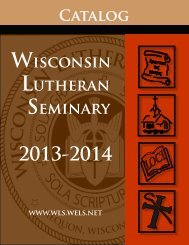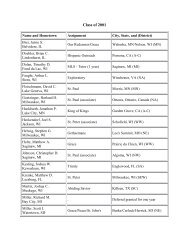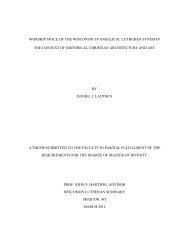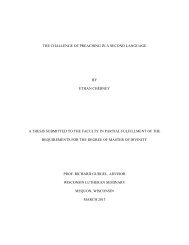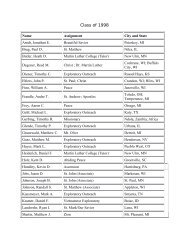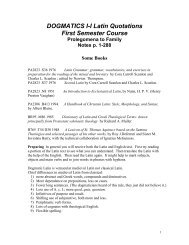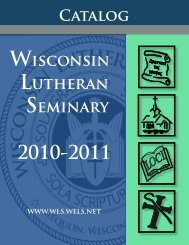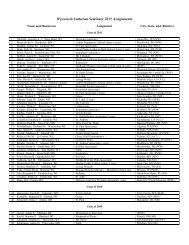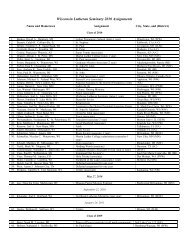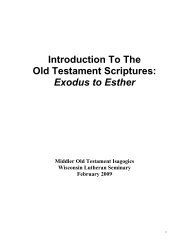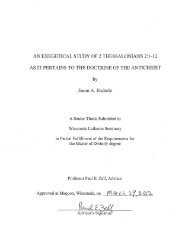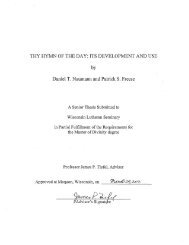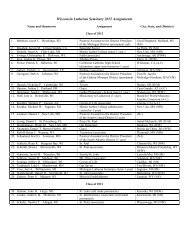Untitled - Wisconsin Lutheran Seminary - WELS
Untitled - Wisconsin Lutheran Seminary - WELS
Untitled - Wisconsin Lutheran Seminary - WELS
Create successful ePaper yourself
Turn your PDF publications into a flip-book with our unique Google optimized e-Paper software.
prophetic nor apocalyptic. Only after a study of these portions of Scripture and in light of these<br />
portions of Scripture should one begin to try to study or understand what has been written<br />
regarding this person in Daniel or Revelation. The primary source of Scripture on which the<br />
<strong>Wisconsin</strong> Evangelical <strong>Lutheran</strong> Synod (<strong>WELS</strong>) bases their doctrine of the Antichrist is found in<br />
Paul’s second letter to the Thessalonian Christians. Therefore the focus of this thesis will center<br />
on this portion of Scripture.<br />
Background to the letter to the Thessalonians<br />
We learn from Acts 16-18 that Paul wrote this letter while on his second missionary<br />
journey which took place circa AD 49-52. Paul had been in the city of Corinth. There he was<br />
rejoined by his fellow missionaries, Silas and Timothy. Paul had only spent a short time in<br />
Thessalonica, and so he wanted to return yet was unable. “But, brothers, when we were torn<br />
away from you for a short time (in person, not in thought), out of our intense longing we made<br />
every effort to see you. For we wanted to come to you—certainly I, Paul, did, again and again—<br />
but Satan stopped us” (1 Th 2:17,18). Therefore, since Paul was unable to go himself, he sent<br />
Timothy to Thessalonica for his assessment. When Timothy returned and gave his report, Paul<br />
sent his first letter to the Thessalonians. In it he wrote, “Timothy has just now come to us from<br />
you and has brought good news about your faith and love. He has told us that you always have<br />
pleasant memories of us and that you long to see us, just as we also long to see you” (1 Th 3:6).<br />
With this news of encouragement he wrote to them about keeping the faith, living God-pleasing<br />
lives, and enduring in the face of persecution. He also wrote about the final coming of the Lord.<br />
After this first letter he likely received news from Thessalonica concerning certain<br />
congregational issues. Paul wrote them a second letter, seemingly not long after the first, to<br />
address the issues and concerns that had arisen. The issues seemed to stem from the harsh<br />
persecutions they were facing, and this situation led to a misunderstanding of the second coming<br />
of Christ. It seems as though some were of the opinion that Christ had already had come and his<br />
arrival had been missed. This misunderstanding had resulted in laziness, idleness, and<br />
relinquishing of jobs. In addition, it appears that the reports of said arrival were falsely attributed<br />
to Paul. “Paul therefore decided to write a second letter; chapter two is his Spirit-inspired<br />
attempt to cool off feverish expectation without quenching the hope that would sustain them in<br />
20 Thomas Nass, End Times: Jesus is Coming Soon (Milwaukee, WI: Northwestern Publishing House,<br />
2011), 102.<br />
10



